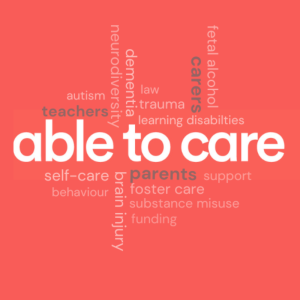
Tuesday Sep 10, 2024
Transforming Family Communication: Expert Parenting Tips with Dr. Jane Gilmore
In this episode of the Able to Care podcast, host Andy Baker sits down with Dr. Jane Gilmour, a consultant clinical psychologist at Great Ormond Street Hospital and course director at University College London. Dr. Gilmour, co-author of "How to Have Incredible Conversations with Your Child," shares her extensive experience in child development, neuropsychology, and managing challenging behaviours in children. They dive into practical strategies for improving communication between caregivers and children, highlighting the importance of emotional literacy, visual tools, and drawing exercises to enhance conversation and connection. Dr. Gilmour also discusses how to foster supportive environments for children, particularly those in the care system, and offers valuable insights on building stronger relationships through meaningful interactions.
How to Have Better Conversations with your Child:
https://www.amazon.co.uk/Have-Incredible-Conversations-your-Child/dp/1787756408
The Incredible Teenage Brain:
https://www.amazon.co.uk/Understanding-Teen-Brain-Gilmour-Jane/dp/1785925571
Key Timestamp:
00:00:00 – Introduction
00:01:10 – Overview of Dr. Gilmore’s Work and Books
00:02:30 – The Importance of Emotional Literacy in Children
00:10:10 – Using Drawing as a Tool for Communication with Kids
00:20:00 – Understanding the Four Compass Points: Who Are You, How Are You
00:29:00 – Building Trust and Relationships with Children Through Conversations
00:38:45 – Real-Life Impact and Feedback from Families Using the Book
00:47:20 – Fostering Emotional Literacy in Different Care Settings
00:55:30 – How to Apply these Tools with Teenagers and Adolescents
01:01:50 – Conclusion and Where to Find Dr. Jane’s Resources
The Power of Emotional Literacy –
Teaching children to identify and articulate their emotions is crucial for their mental health and relationship-building. Using tools like drawing can make these conversations more accessible for kids.
Engaging Through Creativity –
Simple, creative methods like drawing and storytelling can open up meaningful conversations with children, allowing them to express feelings they may otherwise struggle to communicate.
Flexibility in Communication –
Understanding that communication doesn’t always need to be verbal or intense. Incorporating non-verbal cues, like shared activities or allowing breaks, helps foster a safe and supportive space for children to express themselves.
Enjoyed this episode? Don't miss out on future conversations! Make sure to subscribe to our podcast for upcoming episodes featuring insightful guests and fantastic hosts. Stay connected! Follow us on social media @abletraining on LinkedIn, Facebook and Instagram, @abletocarepodcast on TikTok) for behind-the-scenes content, updates, and community engagement. Want to delve deeper into topics discussed on the show? Visit our training website https://www.able-training.co.uk/ for valuable resources and courses to support caregivers on their journey. Thank you for listening! Your support means the world to us. Stay tuned for more inspiring conversations
No comments yet. Be the first to say something!